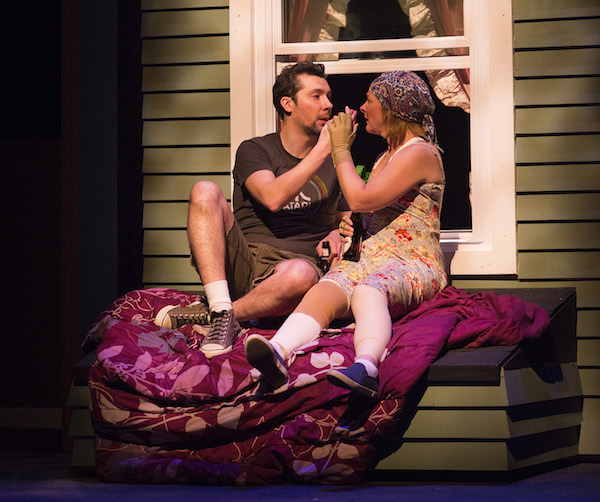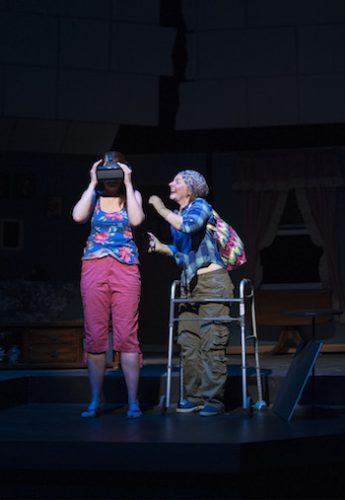Theater Review: “Ugly Lies the Bone” — Illusions of Support
With this production, Penobscot Producing Artistic Director Bari Newport has raised the artistic bar for Bangor’s premiere theater company.
Ugly Lies the Bone by Lindsey Ferrentino. Directed by Bari Newport. Scenic design by Tricia A. Hobbs. Sound design by Katie Guzzi. Lighting design by Scout Hough. Costume and SPX design by Kevin Koski. Game and projection design by Charles Carter and Brave Williams. Produced by the Penobscot Theatre Company at the Penobscot Theatre, Main Street, Bangor, Maine, through April 1.

Brad LaBree and Rachel Burttram in the Penobscot Theatre Company production of “Ugly Lies the Bone.” Photo: Magnus Stark.
By David Greenham
Lindsey Ferrentino’s bold 2014 play Ugly Lies the Bone begins with a soulful version of a Civil War-era song that everyone knows: “When Johnny comes marching home again, Hurrah! Hurrah! We’ll give him a hearty welcome then, Hurrah! Hurrah!” While the song plays, we see injured army veteran Jess (Rachel Burttram), hobbled, scarred, and bandaged, standing with the help of a walker in the virtual reality lab at a local VA hospital. She’s beaten but still defiant, thoroughly unimpressed by the choice of music. “I have military music and Paul Simon,” a voice (Johanna-Karen Johannson) explains. “Guess which one I’ll choose,” Jess replies, sarcastically.
Jess has returned to her family home near Cape Canaveral, Florida following three tours of duty in Afghanistan. Her final tour ended abruptly after she encountered an improvised explosive device (IED), which left her burned and scarred over most of her body. She is in chronic pain from a series of skin grafts and operations. Jess may be unrecognizable on the outside, but she’s feisty, spirited, and incredibly brave on the inside.
She’s living with her sister Kacie (Amy Roeder) in their mother’s house. Kacie is making the most of a difficult domestic situation, but it’s not going so well. Her kid sister is disfigured, battle-scarred, and cynical while their mother (Johanna-Karen Johannson) is in a nursing home battling dementia. On top of that, Kacie’s fiancé Kevin (Allen Adams) is an underachieving lump who has figured out how to parlay a knee injury into full disability support.
We also meet Stevie (Brad LaBree), Jess’ quirky and confused former boyfriend, who is now unhappily married and working at a convenience store that caters to Space Coast tourists. He’s forced to wear a silly work outfit, including a beanie with a tiny space shuttle dangling on top.
In this era of extreme political division, partisan battles, and attacks on those who think differently, there’s one thing on which most Americans seem to agree: enthusiastic support for those who have served in the military. We advertise, non-stop, our pride for our veterans. But, look carefully enough, and the flag waving and proclamations of “Thank you for your service” ring hollow. Ugly Lies the Bone is a play that examines our illusions of military assistance.
Nearly half of the script takes place in a virtual reality (VR) lab at a VA hospital. We learn some about the process of using VR to ease the pain of injured veterans during rehabilitation. Director Bari Newport, Burttram, and the voice of Johannson manage to make what might be a dry ‘educational’ experience exciting, even fascinating. Kudos should also go to game and projection designers Charles Carter and Brave Williams, who create a virtual reality experience that involves the entire audience.
While the video effects are a highlight, it’s the production’s acting and directing that makes Ugly Lies the Bone such a cracklingly satisfying piece of theater. It’s an 80-minute dive into a world that is bent but somehow not broken.
LeBree’s Stevie manages to express his hopes and wishes while trapped in the constraining reality of his marriage and his job. Adams hits all the right notes as Kelvin — he makes the surprising twist at the end vivid. Johnannson, who provides the voice from the control room in the VR lab, supplies the proper amounts of support and pressure — an admirable goad for Jess. The actress also turns in a heart-tugging cameo as the mother.
As Kacie, Amy Roeder gives the production’s most nuanced performance. Her expressions of hope and optimism nimbly hide the character’s worry and sorrow. Only, via an aside from Kelvin, do we learn that the woman cries herself to sleep every night. Roeder’s Kacie is the most buoyant, and probably the most damaged, figure in the play.

Amy Roeder (left) and Rachel Burttram in the Penobscot Theatre Company production of “Ugly Lies the Bone.”
But it’s the hell-bent, tour-de-force performance of Rachel Burttram that makes Ugly Lies the Bone worth the drive to Bangor. She’s feisty, angry, determined, and always strong. Thanks in part to Kevin Koski’s costumes and make-up effects, there is no doubt that this is a severely burned and injured person. Despite a knee she can’t bend, and an arm that she can barely use, Burttram’s Jess somehow manages to put a joyous bounce into her steps. In fact, she practically floats around the stage — while using a walker. When Jess crams her mangled body through a window to watch the space shuttle launch just one more time, Burttram manages to convey gratitude through the figure’s groans and screams of pain.
With this production, Penobscot Producing Artistic Director Newport has raised the artistic bar for Bangor’s premiere theater company, ably assisted by Tricia A. Hobbs’ set, Katie Guzzi’s lighting, Scout Hough’s lights, and Belinda Hobbs’ well-chosen props. Ugly Lies the Bone might seem a bold choice for some — this evening is not dedicated to entertainment or inspiration — but it’s proof, once again, that live theater can and should tackle tough public issues in ways that are personal and accessible. Unfortunately, Ugly Lies the Bone takes on particular urgency now. The play provides an all-too-stark reminder that, if America is going to be in a rush to create disabled veterans (John Bolton, are you listening?), we better damn well make sure we care for them and their families for as long as they live.
David Greenham is an adjunct professor of Drama at the University of Maine at Augusta, and is the Program Director for the Holocaust and Human Rights Center of Maine. He spent 14 years leading the Theater at Monmouth, and has been a theater artist and arts administrator in Maine for more than 25 years.
Tagged: David Greenham, Lindsey Ferrentino, Penobscot Theatre Company, Ugly Lies the Bone
